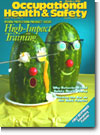
October 2004
Cover Story
By Barry R. Weissman
YOU have read the MSDS for the special alcohol that your plant uses and it says to use eye protection. But what does that mean?
Features
By CDR Don Williams, REHS, MPH
INDOOR air pollution has been present since man moved into enclosed shelters. The earliest dwellings, from caves to lean-tos, undoubtedly held some amount of pollutants, especially once fire was domesticated.
By Ross Coulter
AS Diebold, Inc.'s corporate office completes the successful rollout of its comprehensive workplace safety program, its manager of corporate safety sets his sights on company-wide implementation--and "won't rest" until Diebold's commitment to employee safety is fulfilled.
By Drew Marchetti
CATASTROPHES happen every day. Fires, floods, power outages, and other emergencies can destroy property and threaten lives anywhere, at any time.
By Larry Wilson
THERE's a lot of b.s. in behavior based safety, to be sure, and no shortage of people pointing it out. But even the most hard-nosed of opponents never seem to argue about the incredibly significant decrease in injuries that are reported! We're talking about a 60-90 percent decrease in injuries within three to five years--on average.
By Bob Henderson
VOLATILE organic compounds (VOCs) are organic compounds characterized by their tendency to evaporate easily at room temperature.
By Winston Wolfe
THE purpose of this article is to review developments that have taken place in the industrial safety eyewear market within recent years, help the reader take full advantage of the present offerings, and possibly provide some insight into what may be around the safety eyewear corne
By Rebecca Geissler
IT is entirely possible employees will never need to use emergency drench showers and eyewashes in a facility. That is, if primary protection systems are used effectively and the procedures are well designed.
By Casey Hayes
A high-pressure pipe bursts or a barrel falls off of a forklift. An accident can happen in an instant! Thousands of industrial and commercial accidents occur each year involving airborne particles and chemicals such as corrosives (acids and bases), oxidizers, and solvents.
Departments
By Jerry V. Teplitz, JD, Ph.D.
THE thumping in your head just won't go away. Neither will your 5 p.m. deadline. What can you do? Let's face it: Headaches and the business world go hand in hand.
By Ronnie Rittenberry
IF you're reading this column online, it's probably too late. You may well already have it, whether or not you're even aware of it. And even if you're reading a hard copy, if you're otherwise a regular computer user, there's a good chance you are afflicted with it, too.
By Jerry Laws
HERE's a rulemaking that has gone seriously awry. With its "limited reopening of the rulemaking record" in the Employer Payment for Personal Protective Equipment rule, OSHA this year did much worse than nothing. It turned a well-settled safety topic into a cauldron, thus creating a can of worms its stakeholders aren't sure can be sorted out.